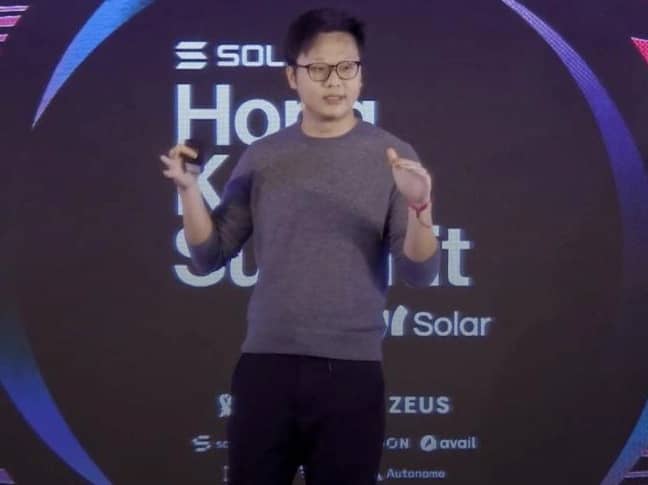Jason Li
Jason Li는 솔라나 블록체인에 기본적으로 구축된 리스테이킹 프로토콜인 Solayer Labs의 공동 창립자입니다. Solayer의 엔지니어링 책임자로서 그는 사용자를 위한 자산 수익을 최적화하면서 솔라나의 확장성과 보안을 향상시키도록 설계된 혁신적인 블록체인 인프라 개발을 이끌고 있습니다. [4] [1] [2]
개요
Jason Li는 솔라나 블록체인에서 분산형 애플리케이션이 향상된 네트워크 대역폭을 달성할 수 있도록 지원하는 Solayer 작업을 통해 블록체인 산업에서 주목할 만한 인물로 자리매김했습니다. 이 프로토콜을 통해 사용자는 SOL 토큰 또는 솔라나 기반 유동성 스테이킹 토큰(LST)을 다시 스테이킹하여 sSOL이라는 재스테이킹된 자산으로 변환할 수 있습니다. 그런 다음 이러한 토큰은 솔라나에서 다양한 dApp 및 활성 검증 서비스를 지원할 수 있습니다. Li의 기술 전문 지식은 Infiniband RDMA를 활용하여 마이크로초에 가까운 노드 간 통신을 통해 블록체인 성능을 하드웨어 한계까지 끌어올리는 InfiniSVM이라는 Solayer의 혁신적인 아키텍처를 개발하는 데 중요한 역할을 했습니다. [1] [2] [4]
교육
Jason Li는 UC Berkeley에서 컴퓨터 과학 학사 학위를 받았으며, 3.93/4.0 GPA로 최우등으로 졸업했습니다. Berkeley에서 그는 Berkeley의 블록체인에 참여했으며 컴퓨터 보안 및 운영 체제 과정의 조교로 활동했습니다. 그는 또한 Haas School of Business에서 비즈니스를 공부했으며 이전에는 싱가포르의 Victoria Junior College에 다녔으며 그곳에서 로봇 공학 클럽을 이끌었습니다.
경력
Li는 2017년부터 2018년까지 Cointelegraph의 BlockShow에서 중화권 지역 책임 관리자로 블록체인 분야에서 경력을 시작했습니다. 같은 기간 동안 그는 또한 Intuition에서 핀테크 임원 트레이너 및 컨설턴트로 활동하면서 나중에 그의 블록체인 벤처에 정보를 제공할 금융 기술 분야에서 귀중한 경험을 얻었을 것입니다.
2018년 Li는 InkyLabs Inc를 공동 설립하고 엔지니어링을 이끌면서 첫 번째 기업 벤처를 시작했습니다. 이후 2019년부터 2022년까지 LoopChat을 공동 설립하고 엔지니어링 리더로 활동하면서 블록체인 기술 및 분산형 애플리케이션에 대한 전문 지식을 더욱 개발했습니다.
2022년 Li는 MPCVault를 공동 설립했으며 현재 이사회에서 계속 활동하고 있습니다. 이 벤처는 MPC(Multi-Party Computation) 기술이 암호화폐 애플리케이션에서 안전한 키 관리에 자주 사용되므로 블록체인 보안 및 인프라에 대한 그의 전문 지식 증가에 기여했을 것입니다.
Li의 블록체인 분야에 대한 가장 최근의 기여는 Solayer Labs의 공동 설립과 함께 이루어졌으며, 현재 엔지니어링 책임자로 활동하고 있습니다. Solayer에서 Li는 솔라나 블록체인의 보안과 확장성을 향상시키는 리스테이킹 프로토콜을 개발하는 데 중요한 역할을 했습니다. Li가 설계하는 데 도움을 준 이 프로토콜의 혁신적인 아키텍처는 초당 100만 건 이상의 트랜잭션과 100Gbps를 초과하는 네트워크 대역폭을 가능하게 합니다.
Li의 기술 리더십 하에 Solayer는 2024년 1분기에 출시되었으며 빠르게 솔라나 생태계의 중요한 구성 요소가 되었습니다. 이 프로토콜은 LST 채택의 유동성 문제를 해결하고 가격 영향과 트랜잭션 수수료를 최소화하는 단일 sSOL/SOL 풀 설계를 통해 사용자 친화적인 스테이킹 경험을 제공합니다.
기업 벤처 사이에서 Li는 2023년부터 2024년까지 Youpi Inc.에서 선임 소프트웨어 엔지니어로 일하면서 소프트웨어 개발에서 기술 기술을 더욱 연마했습니다.
Li의 기술 지침 하에 있는 Solayer는 Polychain Capital, Binance Labs 및 Anatoly Yakovenko(솔라나 공동 창립자)를 포함한 저명한 투자자로부터 상당한 지원을 확보했습니다. 이러한 지원을 통해 Solayer는 2023년 8월 현재 1,200만 달러의 시드 자금을 확보할 수 있었습니다.
Li는 블록체인 산업 행사에서 연사로 활동하면서 리스테이킹, 솔라나 확장, 실물 자산 토큰화 및 하드웨어 확장에 대한 전문 지식을 공유했습니다. [1] [2] [3] [4] [5] [6] [7] [8] [9] [10]
인터뷰
Web3 인프라 및 확장성 #01
2025년 1월 7일 CryptoNews Spotlight 에피소드에서 Solayer Labs의 공동 창립자인 Jason Li는 솔라나 네트워크에 대한 평가와 새로운 Web3 애플리케이션에 대한 의미를 설명했습니다. Li는 솔라나의 용량이 초당 최대 100만 건의 트랜잭션으로 보고되었으며, 이는 핵심 사용자 워크플로를 변경하지 않고 처리량과 응답성의 균형을 맞추는 것을 목표로 하는 프로토콜의 기술적 기반 역할을 한다고 언급했습니다.
Li는 “reaking”(재스테이킹)을 스테이킹된 자산이 여러 온체인 프로세스에 동시에 참여하여 기존 스테이킹 모델의 제약 조건을 넘어 유동성 풀과 기능적 유틸리티를 모두 확장할 수 있는 메커니즘으로 설명했습니다. 그는 이 모델이 기존 금융 시스템에서 상속된 진입 장벽을 줄이고 분산형 네트워크에 대한 더 광범위한 참여를 지원할 수 있다고 제안했습니다.
Binance Labs와의 협력에 대해 논의하면서 Li는 파트너십이 개발자 도구 및 인터페이스 개선의 더 빠른 통합을 촉진한다고 밝혔습니다. 그는 복잡한 명령줄 작업이 아닌 간소화된 경험을 통해 암호화폐 부문에 진입하는 사용자를 지칭하기 위해
